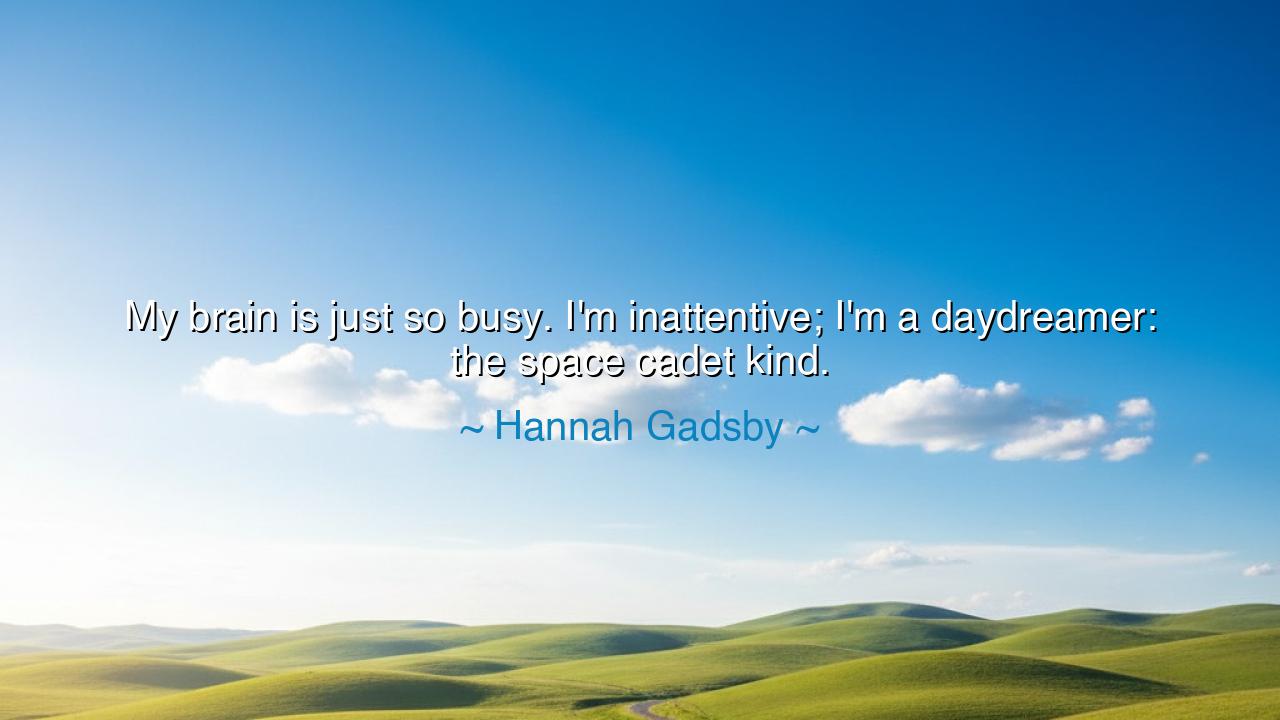
My brain is just so busy. I'm inattentive; I'm a daydreamer: the






Hear now the words of Hannah Gadsby, a voice of both sorrow and laughter, who confessed: “My brain is just so busy. I’m inattentive; I’m a daydreamer: the space cadet kind.” This utterance, humble and raw, is more than self-description; it is the hymn of countless souls who wander through the labyrinth of thought, pulled not by the world before their eyes but by the galaxies within. It speaks of the restless mind, ever-churning, and of the dreamer, who dwells between heaven and earth, often misunderstood by those who walk the solid ground of daily tasks.
What does it mean for the brain to be “so busy”? It is to live with tides of thought that never rest, to be surrounded by voices, visions, and possibilities that clamor for attention. Some may call this weakness, yet in truth it is a sign of abundance. The daydreamer holds worlds within, while others see only one. The inattentive mind may lose sight of the path before it, but in that wandering it discovers trails unseen, treasures overlooked by those who march only straight ahead.
The ancients knew such souls. Consider Archimedes, who, lost in contemplation, drew figures in the sand while armies stormed the city of Syracuse. To others he seemed a space cadet, inattentive to danger. Yet within his mind dwelt the laws of geometry and mechanics that would change the fate of nations. His “busy brain” was his gift, though it set him apart. So too Gadsby’s words remind us that what the world calls distraction may be the wellspring of genius.
Yet this condition bears weight as well as blessing. To be forever in motion within the mind can bring exhaustion, disconnection, even loneliness. The daydreamer often feels out of step with society, as though their head floats among the stars while their body stumbles on earth. Hannah Gadsby speaks with candor, not glorifying the wandering mind, but admitting its struggles. In this she gives voice to many who suffer in silence, who believe themselves broken when they are only different.
And yet, O listener, let us not despise difference. For is not the world enriched by those who dream? The great painters, the poets, the inventors, the prophets—were they not all called inattentive, strange, otherworldly? Their neighbors mocked them, their contemporaries misunderstood them, yet their visions gave birth to new horizons. Thus, the space cadet is not merely an outcast, but a pioneer. To drift in thought is not always to be lost; sometimes it is to scout the edges of possibility for the sake of all.
Therefore, the lesson is clear: do not curse the busyness of your brain, nor scorn the wandering of your thoughts. Instead, learn to harness them, to give them shape, to let them flow into creation. For unbridled imagination is a storm, but guided imagination is a river that nourishes the earth. Those who are inattentive to the mundane may yet be attentive to the eternal.
Practical action lies before you. If your mind is restless, grant it discipline through small anchors: writing, art, meditation, or the rhythm of daily rituals. Channel your daydreams into creation, whether humble or grand. And if you meet a dreamer, do not mock them as a “space cadet,” but honor them, for they may be carrying the seed of tomorrow’s vision. In this way, society grows not by silencing the distracted, but by welcoming the fruits of their inner cosmos.
So remember the confession of Hannah Gadsby: “My brain is so busy.” Hear it not as a flaw, but as the testimony of a dreamer. For the world needs both the steady hand and the restless mind, both the grounded and the star-bound. And in their union lies the fullness of human strength.






AAdministratorAdministrator
Welcome, honored guests. Please leave a comment, we will respond soon